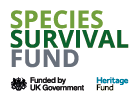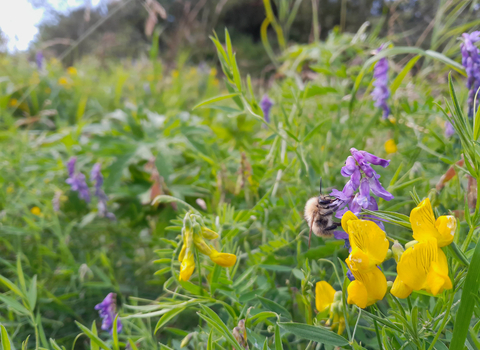
What is Newcastle's Nature Networks?
The Newcastle’s Nature Networks (NNN) project is supporting pollinator networks across Newcastle, building upon momentum created as part of our Beelines North East project, which ended in April 2023. This new two-year project is a collaboration between seven partner organisations. It is supported by £701,417 from the Government’s Species Survival Fund, a short-term programme to create and restore habitats and reverse the decline of species across England, delivered on behalf of Defra by the National Lottery Heritage Fund.
NNN will deliver habitat improvements to create and restore 41 green spaces across public parks, nature reserves and previously developed land, to support assemblages of pollinator species. Learning from studies and expert advice, focus is on the co-ordinated conservation and management of habitats for a range of species across a large area, providing better connectivity across urban and peri-urban areas, and improving specific habitats on individual sites to halt the decline in UK Priority BAP species, including dingy skipper, wall and small heath.
Collectively, NNN partners are planning to improve 18.3ha of grassland habitat, restore 2.2ha of lowland heathland, manage 20ha of wetland sites, install a floating biomatrix, tackle invasive species and restore 80.5ha of lowland mixed deciduous woodland. There are volunteering opportunities, training for staff and volunteers and specialist monitoring to assess species abundance and change following habitat improvements.
What will the work involve?
Three of our nature reserves are included in this project: Fencerhill Wood, St Nicholas Park and Big Waters.
At Fencerhill Wood the focus is on control of invasive species, in particular one of our ongoing challenges: the presence of large areas of Himalayan balsam. This invasive non-native plant shades out native species, competes with them for pollinators and can contribute to riverbank erosion. Manual control is time consuming and requires ongoing vigilance and at Fencerhill Wood, Himalayan balsam is present upstream and on surrounding land. Despite a lot of effort this site easily becomes re-infested, as Himalayan balsam seeds are moved by water as well as being fired up to seven metres by their exploding seed pods! The NNN project has enabled us to get involved in a trial of a novel control method for this invasive species.
Other non-native and/or invasive flora are also present at Fencerhill Wood in smaller numbers and as part of NNN, we will be working with volunteers to remove these (you can help us on this site and others by following the Be Plant Wise advice and encouraging others to do so too - prevention is better than cure).
Some greater reedmace (Typha latifoli) will also be removed to create areas of open water, as without intervention standing open water habitat would be lost on this site. Site access will be maintained by improving a stretch of the boardwalk.
At the home to our main office, our St Nicholas Park Nature Reserve, NNN is supporting appropriate management of the meadow areas, improvement to woodland structural diversity and regular volunteer involvement in site maintenance, including habitat management, litter picking and managing planted borders for pollinators.
Through NNN, at our Big Waters reserve we are installing new field gates to enable machine access and better manage grazing regimes. We are controlling blackthorn encroachment into grassland habitat, managing dense scrub beside the hide for wildlife and maintaining the bird feeding station, net rides and wader scrapes to enable continued monitoring of the bird population. This funding also enables us to renew and improve site signage, to train volunteers in use of brushcutters and in squirrel monitoring and management.
How long is the project and who else is involved?
The Project commenced in June 2024 and finishes at the end of February 2026. It is managed by a Steering Group comprising representatives from each of the partners. The other project partners are Natural History Society of Northumbria, Newcastle City Council, Northumbria University, Ouseburn Farm, Ouseburn Trust, and Scotswood Garden. Together we share a vision for a greener city, with communities and organisations working together to improve nature, adapt to climate change and provide opportunities for people to develop green skills. Each partner brings unique and complementary experience, skills and resources, enabling more to be achieved than if we each worked alone.
Funding
This project is funded by the Government's Species Survival Fund. The fund was developed by Defra and its Arm's-Length Bodies. It is being delivered by The National Lottery Heritage Fund in partnership with Natural England and the Environment Agency.


